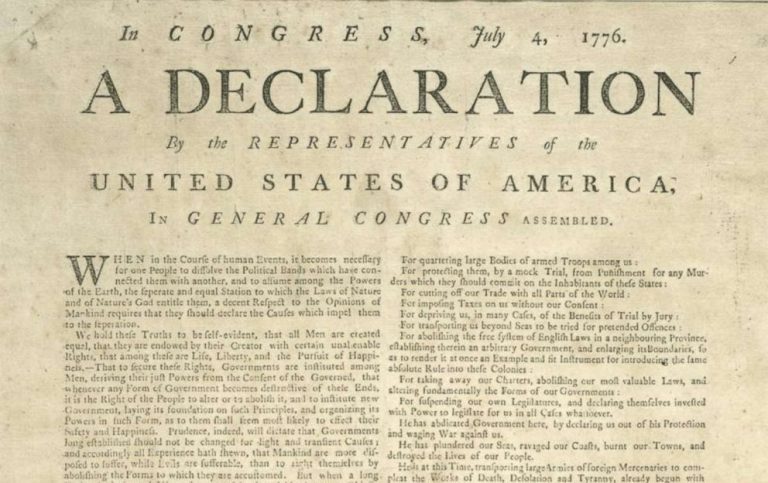Last Thursday was Independence Day, commemorating when delegations from the thirteen colonies approved the Declaration of Independence. Often overlooked today is that the Declaration of Independence asserted the independence of each colony as its own nation — a state. The Declaration of Independence did not assert the existence of an overarching nation of the United States of America.
This assertion of the independence of the separate colonies as states is made crystal clear in the final paragraph of the Declaration of Independence:
We, therefore, the Representatives of the united States of America, in General Congress, Assembled, appealing to the Supreme Judge of the world for the rectitude of our intentions, do, in the Name, and by Authority of the good People of these Colonies, solemnly publish and declare, That these United Colonies are, and of Right ought to be Free and Independent States; that they are Absolved from all Allegiance to the British Crown, and that all political connection between them and the State of Great Britain, is and ought to be totally dissolved; and that as Free and Independent States, they have full Power to levy War, conclude Peace, contract Alliances, establish Commerce, and to do all other Acts and Things which Independent States may of right do. And for the support of this Declaration, with a firm reliance on the protection of divine Providence, we mutually pledge to each other our Lives, our Fortunes and our sacred Honor.
The later adoption of the Constitution lodged the ability to exercise some power in a new US government. But, the Constitution also made explicit that those powers are limited in scope and only the ones enumerated in the document. The Bill of Rights that followed further reinforced, especially in the Tenth Amendment, this limited and enumerated nature of the US government’s ability to exercise power. The states remained sovereign over many things under the Constitution.
Over time, the new government created in the Constitution asserted power after power not authorized in the Constitution. The states, thus, became, in practice, less and less independent.
In the last few decades, states have taken action to reassert some of the independence declared nearly 250 years ago in the Declaration of Independence. One notable way has been via a progression of states ducking out of the war on medical marijuana and even on marijuana generally that the US government continues to pursue. In response, the US government has largely backed down, practicing deference in states to the states’ respective liberalized approaches.
Last week, the Fourth of July gave occasion for the celebration of a new revolt by states against the US government’s grabbing of power beyond constitutional limits. July 5 at Reason, Patrick McDonald recounted that in June “the Utah legislature passed resolutions directing state government entities to ignore the Biden administration’s new interpretation of Title IX, joining numerous other states who have opposed the administration’s proposed expansion of anti-discrimination protections.” Providing further details, McDonald wrote:
The issue stems from the Biden administration’s proposed interpretative rule, released in April, which would expand the enforceable scope of Title IX of the Education Amendments Act. Title IX bars discrimination “on the basis of sex”; the Biden administration’s new rule interprets this clause as prohibiting discrimination based on “sexual orientation” and “gender identity.” Opponents say the Department of Education’s new rule could force states to allow biological men to play in women’s sports.
The new rule, which uses 423 pages to clarify a clause that is 37 words long, is set to go into effect on August 1.
But whether it will go into effect is increasingly a matter of dispute. With the passage of the recent resolutions, Utah joins a growing number of states—including Texas, Louisiana, and Arkansas—that are officially ignoring the Biden administration’s new Title IX rules. Additionally, 26 state Attorneys General have filed lawsuits against the Department of Education challenging its interpretation.
May states keep asserting their independence in regard to this and many other areas where the US government steps beyond its constitutional confines, sometimes as here even by mere executive decree with no legislative action — an additional constitutional usurpation. These 423 pages of regulations are an affront to the independence of the states. Given how much the US government has extended its reach beyond constitutional limits, it may be a conservative estimate to suggest that states should similarly disregard 90 percent of the pages comprising US regulations.

